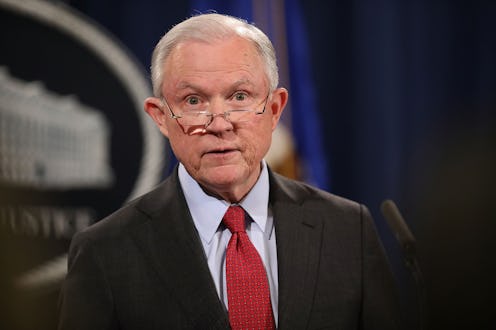News
Jeff Sessions' Solution To The Opioid Crisis? Just Take Some Aspirin Already

The current opioid crisis is the deadliest drug epidemic of its sort in the nation's history, and Attorney General Jeff Sessions has offered an idea for stemming its fatal tide. In the course of a speech in Tampa Bay, Florida, Sessions said people "need to take aspirin sometimes," arguing that too many prescription drugs are fueling the opioid emergency.
Sessions made similar comments on Tuesday, during a speech at the Heritage Foundation for the anniversary of Ronald Reagan's birthday. "Sometimes you just need to take two Bufferin or something and go to bed,” he said.
Sessions' prescription for treating the opioid crisis came under immediate criticism from some quarters, with Denis Slattery of The Seattle Times calling it "overly simple." The AG has made a slew of comments indicating that, for many, taking opioid medications for pain amounts to a kind of weakness.
"I am operating on the assumption that this country prescribes too many opioids,” Sessions said Tuesday. “People need to take some aspirin sometimes and tough it out a little.”
And during his Wednesday speech, Sessions favorably recounted how Chief of Staff John Kelly refused prescription drugs following a surgery. After mimicking Kelly's voice to the amusement of the crowd, Sessions got serious. "You can get through these things," he said.
While Sessions' comments struck many as simplistic and guilty of victim-blaming, his focus on prevention belies the larger question of what role pharmaceutical companies played in pushing opioid drugs as necessary solutions to the "problem" of pain.
A number of cities, counties, and states are suing pharmaceutical companies for misleading doctors about the true side effects of their products. Many have also been accused of engaging in other underhanded behaviors to further their profits at the expense of honest research and development.
In late January, Mayor Bill de Blasio announced that New York City was suing Big Pharma over its role in the worsening opioid crisis. “It’s time for Big Pharma to pay for what they’ve done,” de Blasio said in his announcement of the legal action.
The first entity to take such an action was the city of Chicago, filed four years ago in 2014. Chicago Corporation Counsel Stephen Patton said at the time that their rationale was to "stop this deceptive and unlawful marketing and hold these companies responsible for the harm their deception has caused.” That case is still ongoing.
Several other cities have also sued, including Cincinnati, Indianapolis, several cities in Ohio, and Princeton, West Virginia.
Opioid overdoses were responsible for 64,000 deaths in 2016, and they are currently the leading cause of death for Americans younger than 50. The epidemic has claimed more lives annually than gun deaths or car accidents, and has also surpassed the number of fatalities from AIDS during that crisis' peak. Government-tracked deaths from synthetic opioids — like fentanyl and heroin — have seen a stunning 540 percent increase between 2013 and 2016.
Ideas about how to address this urgent crisis vary, but so far, Sessions — and the Trump administration in general — have come under criticism for their response. For his part, Sessions has also blamed marijuana for the uptick in opioid addiction, calling it a "gateway drug" and questioning the findings of the DEA on root causes.
"The DEA said that a huge percentage of the heroin addictions starts with prescriptions. That may be an exaggerated number — they had it as high as 80 percent — we think a lot of this is starting with marijuana and other drugs,” Sessions said. However, several research studies appear to contradict Sessions' assessment.
Andrew Kolodny, the co-director of Opioid Policy Research at Brandeis University, has given Trump himself an "F" grade in terms of action on addressing the opioid crisis. Sessions' flippant suggestion that people opting for aspirin will solve the opioid crisis probably won't improve that grade.